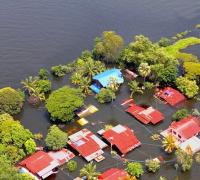Can local governments save the planet?
26 May 2014
Who will save us from climate collapse? The heads of state who negotiate global agreements? The activists who call for climate action? The businesses that “go green”? Or the ordinary citizen on the ground?
Perhaps all of the above, but it seems there’s an important player missing here:In one of the recent status reports from the UN’s Intergovernmental Panel on Climate Change (IPCC), emphasis is given to the role of local governments in addressing climate change.
Let’s be honest: There isn’t much “star quality” about these mundane and bureaucratic local authorities that carry out the everyday administration of cities and rural localities around the world. Indeed, an institution that is first and foremost characterized by being local may seem entirely insignificant in the globalized politics of climate change. So why are local governments now increasingly being mentioned as important actors in addressing climate change? There are several reasons:
Firstly, there is a certain fatigue with the failure of national governments to come to binding agreements on reducing carbon emissions. This year will see the 20th COP summit, and despite renewed hopes in some quarters that a global agreement is getting closer, there has for some time been a growing recognition that it isn’t enough to rely on global fora and national governments to address climate change.
Secondly, while heads of state have been grid-locked in global negotiations, local authorities have often been the ones taking real action. In many large cities around the world, efforts to address issues such as flooding are a very real concern and have forced local authorities to act. Local politicians aren’t necessarily doing this out of care for the environment, but because they are the ones confronted with the problems, costs and public anger generated by flooded sewers or rising sea levels.
Thirdly, as national climate change policies are being developed around the world, attention is increasingly turning to how these policies can actually be implemented. Past debates tended to focus on “what must be done”, while there is a now increasing realization that “who is going to do it” is a critical issue. Here local governments and other local organisations play an important role, because they occupy the institutional “middle ground” between the central state and the local community. Local governments are thereby uniquely positioned to support the adaptation efforts of citizens, and mediate policy and funding processes between local and national levels.
Local governments have also caught on to this logic themselves, and some are actively promoting their role in addressing climate change adaptation. Some have teamed up in national and international networks – such as “the Local Government Climate Roadmap” - in order to influence central governments and global climate change negotiations.
At the 19th climate summit in Warsaw last November, local governments were for the first time invited to participate in a variety of dialogue meetings, and some observers predict that their role in this respect will increase in the future - not just as local branches of a given political and administrative level, but also as players in their own right in international climate change politics. This is particularly so for the world’s mega- cities which not only represent large populations, but are also economic power houses and therefore carry increasing political weight on the international scene.
It is important not to get carried away though. Some very significant factors still constrain the role of local governments in addressing climate change, especially when it comes to developing countries:
- Local governments are an extremely varied group, ranging from sprawling mega-cities to remote rural councils in developing countries. Not surprisingly, it is primarily the former who currently have the resources and capacity to address climate change adaptation. By contrast, local governments in rural Africa, Asia and Latin America – where climate change often has the most severe impacts – tend to have virtually no resources with which to act.
- Being “local” does not necessarily make an institution democratically representative and downwardly accountable. For example, emerging research on locally based adaptation efforts in rural Africa suggest that such projects tend to benefit particular types of producers and social strata (eg cash crop farmers and better-off households), while others get no benefits or are even disadvantaged (eg pastoralists and poor households).
- Local governments in many countries simply do not have the autonomy from the central state that they would like to have. Despite decentralization policies in many developing countries, the central state often seeks to retain control over local developments by decentralizing responsibilities – while withholding finances and decision-making power at the central level. This is doubly unfortunate in the context of climate change adaptation, where the ability to act with flexibility and in response to particular local situations is key.
There are, in other words, a number of substantial obstacles to clear before local governments can fully take on a key role in climate change – especially in developing countries. It is, moreover, important to avoid letting central governments “off the hook”: Their role in providing the national and global frameworks for addressing climate change remains pivotal. Nevertheless, there can be little doubt that local governments have a very significant role to play, and real change often comes from unexpected quarters.
For more information on the role of meso-level institutions in climate change, please see the collaborative research programme Climate Change and Rural Institutions
DIIS Eksperter



